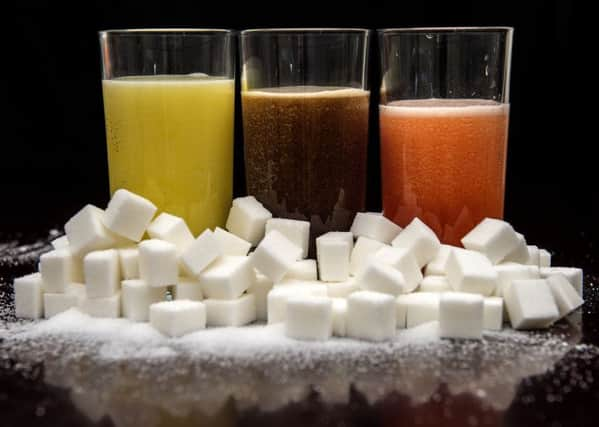Most fizzy drinks contain more sugar than daily limit, study shows


Most carbonated sugar-sweetened drinks exceeded the maximum daily recommendation for sugar intake for adults, they found.
Some contain as many as 12 teaspoons of sugar, according to the study.
Advertisement
Hide AdAdvertisement
Hide AdResearchers examined 169 carbonated sugar-sweetened drinks available in nine UK supermarkets during 2014.
The research, published in the journal BMJ Open, found that on average ginger beer had the highest amount of sugars and ginger ale contained the lowest.
The authors also found a large variation between the same flavoured drinks, with some having just 3.3g of sugar per 330ml can and others having 52.8g - the equivalent of 12 teaspoons.
On average, supermarket own brand products of cola contained lower levels of sugars than branded products.
Advertisement
Hide AdAdvertisement
Hide AdOverall, 91% of the drinks assessed - including cola, cream soda, dandelion and burdock, elderflower, ginger beer, ginger ale, flavoured cola, orange and lemonade - should be given a “red” food warning label, the authors said.
Meanwhile, 55% of cans exceeded the maximum daily allowance of sugar for adults and 73% exceeded daily limits for a child, they found.
It is recommended that people aged 11 and up should have no more than 30g of sugar each day.
To combat the rising tide of obesity, the Government has proposed a new levy on sugary drinks which will come into force in 2018.
Advertisement
Hide AdAdvertisement
Hide AdIt will see products with 5g of sugar per 100ml face a lower rate of tax while those with more than 8g per 100ml will face a higher rate.
Kawther Hashem, co-author of the study and researcher for campaign group Action on Sugar at Queen Mary University of London, said: “Our study shows that the majority of carbonated sugar-sweetened drinks available in supermarkets exceed the maximum daily recommendation for sugar intake for an adult and a child.
“It is therefore not possible to state that carbonated sugar-sweetened drinks can be consumed as part of a ‘healthy balanced diet’ even though drinks companies claim it can be.
“Cola flavour is the most popular flavour in the UK, owing to the huge volume consumed; even small reductions would have a significant impact on free sugars and calorie intake of the population.
Advertisement
Hide AdAdvertisement
Hide Ad“We hope the soft drinks industry levy will make drinks manufacturers reduce the levels of sugar in their products immediately and help reduce our risk of obesity, type 2 diabetes and dental caries.”
Action on Sugar chairman Professor Graham MacGregor added: “This study illustrates the huge contribution of sugar-sweetened drinks to our sugar intake, which is directly linked to the development of obesity and type 2 diabetes.
“We welcome the soft drinks industry levy and particularly the incentive it’s created to companies that want to avoid the levy by reducing the sugar levels to below 5g/100ml.
“This has already resulted in one of the largest supermarkets to reduce sugar in all their own brand soft drinks to below 5g/100ml.
Advertisement
Hide AdAdvertisement
Hide Ad“Suntory have also pledged that they will reduce sugar in all their sugar-sweetened drinks to below the lower band levy. This includes, for instance, Lucozade and Ribena.
“Other supermarkets and branded companies must now follow suit, particularly Coca Cola and PepsiCo, as sugar-sweetened drinks are the main contributor to sugar intake, in children and adolescents.”
Last week, Tesco was praised after announcing that it has cut the amount of sugar in its own brand soft drinks.